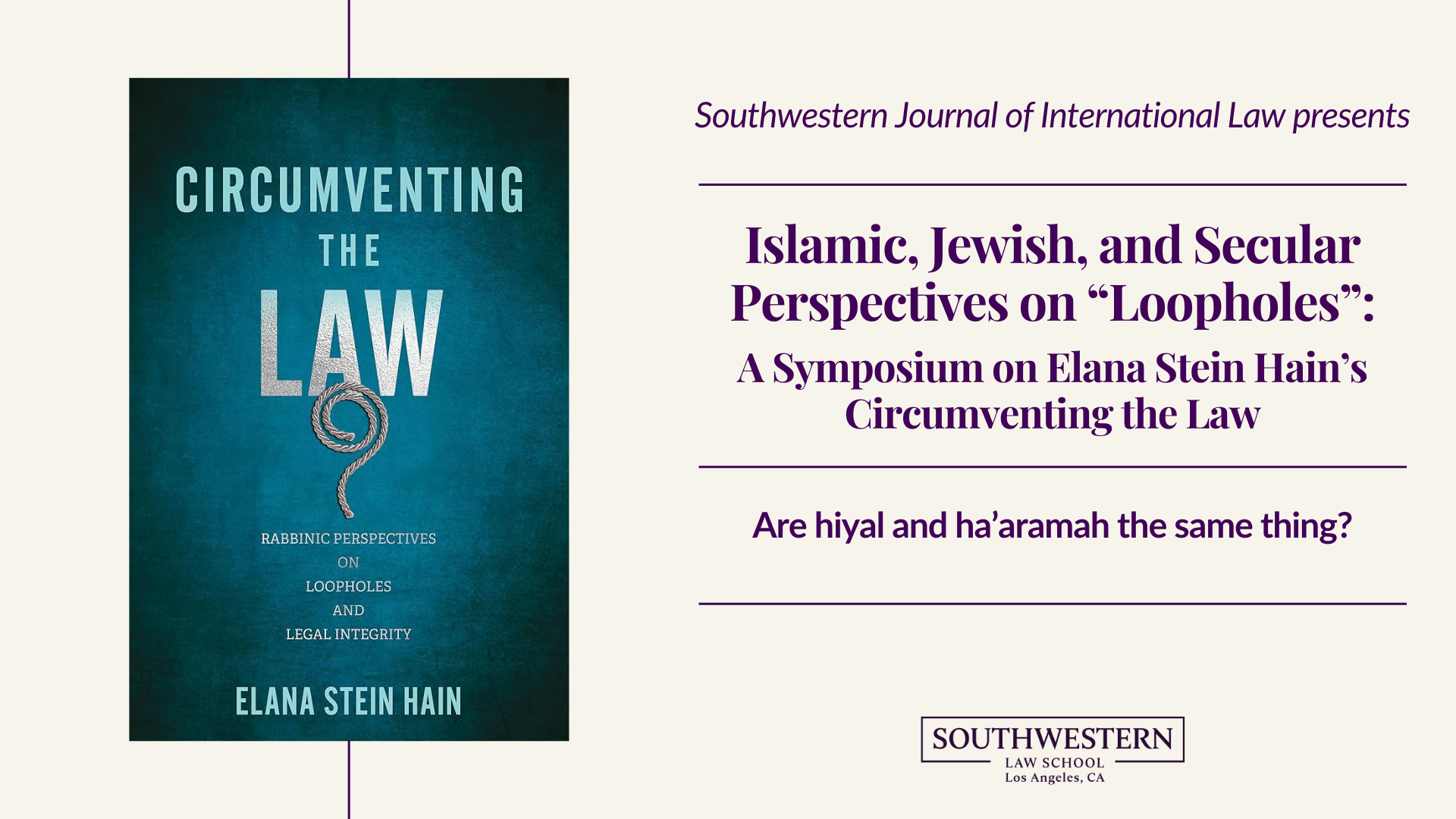Islamic, Jewish, and Secular Perspectives on “Loopholes”: A Symposium on Elana Stein Hain’s Circumventing the Law

November 19, 2025
10:00 A.M. - 12:30 P.M. Pacific Time,
1:00 p.m. (ET US & Canada) | 8:00 p.m. (Israel) | 12:00 a.m. on November 20, 2025 (Jakarta)
Via Zoom
*You will receive an automatic email confirmation
This online symposium examines how “loopholes” operate in Jewish, Islamic, and secular legal traditions, taking as its point of departure Elana Stein Hain’s Circumventing the Law: Rabbinic Perspectives on Loopholes and Legal Integrity (University of Pennsylvania Press, 2024).
The program will explore how different traditions distinguish between legitimate circumventions and evasions that threaten the spirit of the law, and what these debates reveal about authority, intent, and integrity in legal systems.
- Schedule
10:00 a.m.–10:10 a.m.
Introduction
10:10 a.m.–10:30 a.m.
Rabea Benhalim
Legal Loopholes in Jewish & Islamic Law – a feature, not a bug10:30 a.m.– 10:50 a.m.
Arif Maftuhin and Mark Cammack
Eluding God’s Law? Ḥiyal in Islamic Jurisprudence and Southeast Asian Practice10:50 a.m.– 11:10 a.m.
Deborah Barer
Perception and Pragmatics: Loopholes and the Dynamics of Rabbinic Law11:10 a.m.– 11:30 a.m.
Adam Chodorow
Circumventions in Jewish Law and Federal Tax Law11:30 a.m.– 11:50 a.m.
Leo Katz
Religion and Subterfuge: A Commentary on Elana Stein Hain’s Circumventing the Law11:50 a.m.– 12:10 p.m.
Elana Stein Hain
Responding to Comments12:10 p.m.– 12:30 p.m.
Questions/Concluding Thoughts
- About Circumventing the Law
Circumventing the Law probes the rabbinic logic behind the use of loopholes, the legal phenomenon of finding and using gaps within law to achieve otherwise illegal outcomes. The logic of ha’aramah, a subset of rabbinic legal circumventions mostly defined as a tool for private life, underpins both well-known circumventions, such as selling leaven before Passover, and lesser-known mechanisms, such as designating an animal intended for sacrifice “blemished” before birth to allow it to be slaughtered for food instead. Elana Stein Hain traces the development of these loopholes over time, revealing that rabbinic literature does not consistently accept or reject loopholes. Instead, rabbinic Judaism applies categories of evasion (prohibited), avoidance (permitted), and avoision (contested) to loopholes on a case-by-case basis. The intended outcome of a given loophole determines its classification, as does the legal integrity of the circumventive process in question.
Yet these understandings of loopholes are not static―instead, rabbinic attitudes toward loopholing change over time. Early works display an objective, performative understanding of the self and of intention, but evolve over time to reflect more subjective and intimate understanding of the self and intention. This evolution redefines what legal integrity means in Jewish legal philosophy.
Circumventing the Law brings readers through the Second Temple period to the modern era to see how loopholing has evolved over millennia. With a focus on late antiquity, Stein Hain explores tannaitic literature, the Palestinian Talmud, and contemporaneous Greco-Roman and Persian thought to show that when warranted, Jewish rhetoric and philosophy around understandings of loopholes was a unique phenomenon that relied on changes in understanding the definition of integrity itself, a key finding for scholars of Jewish Studies and of religious and of secular law writ large. - Panelists
Deborah Barer
 Deborah Barer is Senior Faculty at the Shalom Hartman Institute of North America. A scholar of rabbinic literature and Jewish ethics, she taught previously at Towson University, Oberlin College, and for Pardes North America. Her forthcoming book, Going Off Script: Improvisational Judgment in the Talmud (March 2026, Oxford University Press), explores how the Talmudic idea of acting lifnim mi-shurat ha-din sheds light on rabbinic approaches to decision-making, as well as the hermeneutic and legal commitments of the Talmudic editors.
Deborah Barer is Senior Faculty at the Shalom Hartman Institute of North America. A scholar of rabbinic literature and Jewish ethics, she taught previously at Towson University, Oberlin College, and for Pardes North America. Her forthcoming book, Going Off Script: Improvisational Judgment in the Talmud (March 2026, Oxford University Press), explores how the Talmudic idea of acting lifnim mi-shurat ha-din sheds light on rabbinic approaches to decision-making, as well as the hermeneutic and legal commitments of the Talmudic editors.Rabea Benhalim
 Rabea Benhalim is an Associate Professor at the University of Colorado Law School and recipient of the 2024 Colorado Law Excellence in Teaching Award, the school’s highest teaching honor. Her research focuses on the development of Islamic and Jewish law in the modern era. Within this area, her current work investigates how secular environments affect interpretations and development of religious law, especially for minority religions. Her work has appeared or is forthcoming in the Minnesota Law Review, the Wisconsin Law Review, and the BYU Law Review, amongst others. She is regularly interviewed by media outlets.
Rabea Benhalim is an Associate Professor at the University of Colorado Law School and recipient of the 2024 Colorado Law Excellence in Teaching Award, the school’s highest teaching honor. Her research focuses on the development of Islamic and Jewish law in the modern era. Within this area, her current work investigates how secular environments affect interpretations and development of religious law, especially for minority religions. Her work has appeared or is forthcoming in the Minnesota Law Review, the Wisconsin Law Review, and the BYU Law Review, amongst others. She is regularly interviewed by media outlets.Prior to joining the Colorado faculty, Professor Benhalim was the 2017-2019 William H. Hastie Fellow at the University of Wisconsin Law School. Her prior work experience as a lawyer and policy expert includes positions at the Brookings Institution, Mayer Brown LLP, Maersk Oil, and the Carter Center. She holds a J.D. from the University of Texas, an LL.M. from the University of Wisconsin Law School, a Master of Islamic Studies from the University of Texas, and a Master of Public Policy Degree from the University of Michigan.
Mark Cammack
 Mark Cammack is Professor of Law at Southwestern Law School. After graduating from the University of Wisconsin Law School, Professor Cammack clerked for Justice Roland Day of the Wisconsin Supreme Court and then spent a year in Indonesia as a Fulbright scholar researching Indonesia’s Islamic courts. Upon returning to the US, Professor Cammack served as an Assistant District Attorney for the New York County DA before entering teaching.
Mark Cammack is Professor of Law at Southwestern Law School. After graduating from the University of Wisconsin Law School, Professor Cammack clerked for Justice Roland Day of the Wisconsin Supreme Court and then spent a year in Indonesia as a Fulbright scholar researching Indonesia’s Islamic courts. Upon returning to the US, Professor Cammack served as an Assistant District Attorney for the New York County DA before entering teaching. His research focuses on the Indonesian legal system with particular emphasis on Indonesia’s Islamic legal system. He is the author with Haider ala Hamoudi of Islamic Law in Modern Courts (Wolters Kluwer, 2018) and co-editor with Michael Feener of Islamic Law in Contemporary Indonesia: Ideas and Institutions (Harvard Univ Press, 2007). In 2002, Professor Cammack served as the United Nations Observer before the Ad Hoc Human Rights Court for East Timor in Jakarta.
Adam Chodorow
 Adam Chodorow is the Jack E. Brown Professor of Law at the Sandra Day O’Connor College of Law, Arizona State University. His research and teaching interests lie in tax and business law. He teaches a variety of tax courses, as well as business organizations. His research focuses on religious taxation and a variety of contemporary tax issues, such as the taxability of virtual income.
Adam Chodorow is the Jack E. Brown Professor of Law at the Sandra Day O’Connor College of Law, Arizona State University. His research and teaching interests lie in tax and business law. He teaches a variety of tax courses, as well as business organizations. His research focuses on religious taxation and a variety of contemporary tax issues, such as the taxability of virtual income.Professor Chodorow has served as associate, vice and interim dean at the college of law. He is also a past Chair of the Teaching Tax Committee of the ABA’s Tax Section and the AALS's Section on Jewish Law.
Before joining the faculty in 2004, Professor Chodorow clerked for Judge Joseph H. Gale of the U.S. Tax Court. At New York University, he won the David H. Moses Memorial Prize for having the highest cumulative academic average and the Harry J. Rudick Memorial Award for distinction in the LL.M. Tax Program. Professor Chodorow was an attorney at Pacific Gas & Electric Company in San Francisco, where he worked on energy-related litigation and regulatory matters. He also practiced commercial litigation for Shartsis, Friese & Ginsburg.
Leo Katz
 Leo Katz is a Frank Carano Professor of Law at Penn Carey Law, University of Pennsylvania. Leo Katz’s work focuses on criminal law and legal theory more generally.
Leo Katz is a Frank Carano Professor of Law at Penn Carey Law, University of Pennsylvania. Leo Katz’s work focuses on criminal law and legal theory more generally.By connecting criminal law, moral philosophy, and the theory of social choice, he tries to shed light on some of the most basic building block notions of the law — coercion, deception, consent, and the use and abuse of legal stratagems, among others.
Professor Katz is the author of several books: Bad Acts and Guilty Minds: Conundrums of the Criminal Law (Chicago, 1987); Ill-Gotten Gains: Evasion, Blackmail, Fraud and Kindred Puzzles of the Law (Chicago, 1996); and Why the Law Is So Perverse (Chicago, 2011), which he researched with the support of a Guggenheim Fellowship.
Together with Stephen Morse and Michael Moore, he edited Foundations of the Criminal Law (Oxford,1999).
Dr. Arif Maftuhin
 Prof. Dr. Arif Maftuhin, M.Ag., M.A.I.S. is an Indonesian scholar whose work bridges Islamic jurisprudence, social justice, and disability rights. He is now the Professor of Islamic Law at UIN Sunan Kalijaga, Yogyakarta, Indonesia. Trained in Islamic legal studies at IAIN Surakarta, he later pursued advanced studies in Islamic law, including a master’s in Islamic Studies and a postdoctoral fellowship at the Hebrew University of Jerusalem.
Prof. Dr. Arif Maftuhin, M.Ag., M.A.I.S. is an Indonesian scholar whose work bridges Islamic jurisprudence, social justice, and disability rights. He is now the Professor of Islamic Law at UIN Sunan Kalijaga, Yogyakarta, Indonesia. Trained in Islamic legal studies at IAIN Surakarta, he later pursued advanced studies in Islamic law, including a master’s in Islamic Studies and a postdoctoral fellowship at the Hebrew University of Jerusalem. His research often pushes the boundaries of conventional Islamic legal discourse, engaging with themes such as disability studies, women’s rights, and the ethics of philanthropy. He is the author of Disability and Islamic Law in Indonesia: Beyond the Rukhṣah and numerous articles exploring how Islamic tradition can respond to contemporary challenges. Beyond academia, Arif is known for his reflective and critical voice in public debates, blending a deep respect for tradition with a commitment to reform. He sees scholarship as both an intellectual and moral project—one that should serve humanity, not just the library shelves.
Elana Stein Hain
 Dr. Elana Stein Hain is the author of Circumventing the Law: Rabbinic Perspectives on Legal Loopholes and Integrity (Penn Press, 2024) which uses loopholes as a lens for understanding rabbinic views on law and ethics. She serves as the Rosh Beit Midrash and a senior research fellow at the Shalom Hartman Institute of North America, which involves research, teaching, writing and educational consulting. She is the host of TEXTing IRL, a bi-weekly podcast that considers issues relevant to Jewish life through the lens of classical and modern Jewish texts.
Dr. Elana Stein Hain is the author of Circumventing the Law: Rabbinic Perspectives on Legal Loopholes and Integrity (Penn Press, 2024) which uses loopholes as a lens for understanding rabbinic views on law and ethics. She serves as the Rosh Beit Midrash and a senior research fellow at the Shalom Hartman Institute of North America, which involves research, teaching, writing and educational consulting. She is the host of TEXTing IRL, a bi-weekly podcast that considers issues relevant to Jewish life through the lens of classical and modern Jewish texts.